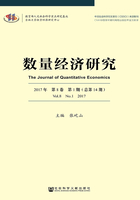
Research on the Transformation Mechanism of Monetary Policy—Based on International Experience
Abstract: With the deepening of the financial marketization reform, the effectiveness of the quantity-based monetary policy has declined. It is imperative to construct a price-based monetary framework with the interest rate as a major policy tool. In this context, this paper analyzed the practice of monetary policy transformation in emerging market economies and developed economies, and then deduced the optimal price-based monetary policy rule under the New Keynesian framework. Finally, it made an empirical research on emerging market economies' and developed economies' panel data, and compared them with China. The results show that:Firstly, the smoothness of China's monetary policy was weaker than the emerging market economies and developed economies, which will lead to a short-term fluctuations in interest rate and be harmful to forming the stable market expectations; Secondly, China's monetary policy over-pegged to economic growth, which weaken the credibility of the central bank; Thirdly, after the financial crisis, the regularity of monetary policy in China had improved, which provided favorable conditions for the transformation of monetary policy. However, in the process of policy transformation practice, we should pay more attention to the short-term volatility of interest rate, and weaken the focus on economic growth target to improve the independence and credibility of the central bank, to effectively guide market expectations and make more forwardlooking monetary policies.
Keywords: Transformation of Monetary Policy Interest Rate Rule Emerging Market Econo-my